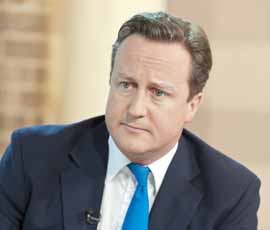Eurozone crisis threat to UK farming

The crisis in the Eurozone and Prime Minister David Cameron’s veto of a Brussels treaty on EU debt, could have a serious impact on British agriculture, according to the NFU.
Questions have been raised about the possible agricultural implications of Mr Cameron choosing not to sign the treaty alongside all other EU member states.
NFU policy director Mr Haworth said: “There has been a lot of speculation that the UK will be further marginalised in Europe and consequently less influential on a range of matters.
“Only time will tell if that is the case. The UK has pursued CAP reform policies over successive reforms which have placed UK negotiators on the margins of the debate, so it is unlikely that Mr Cameron’s actions will change the way in which the UK is already viewed with regards to CAP.
“However on broader regulatory matters where the British voice has been heard in recent years, for example on environmental and market regulation matters, Mr Cameron’s actions may affect Britain’s influence in the EU.”
Commenting on the Eurozone crisis more generally, Mr Haworth said it was a crucial issue for UK farmers as the Eurozone is by far our biggest trading partner and the exchange rates between sterling and euro is the single most important determinant of total farm income.
“If the pound strengthens against the euro, UK exports of agricultural products will become less competitive, imports will become cheaper and the value of CAP support payments will decline,” he said.
In an NFU briefing document also seen by Farmers Weekly the union said that it was too early to predict the outcome but it was still possible that the euro would start to implode.
It also warned that it could be very damaging for agriculture if the use of the veto encouraged Eurosceptics to push for the repatriation of powers back to the UK.
“A worst-case outcome would see the UK remaining in the single market but regaining autonomy over support arrangements.
“That would allow the Treasury to achieve its long-standing goal of removing direct payments altogether.”
The union’s briefing document set out a number of scenarios, on a rising scale of severity:
Scenario one: One or more Eurozone countries could default
In this event the euro could survive albeit weaker. This would be bad news for UK farming. With the pound effectively strengthening against the euro, UK exports would become less competitive, imports from the Eurozone would become cheaper and the value of support payments would decline.
Scenario two: Countries could leave the Eurozone
If it was just Greece the impact on British farming would probably be favourable – the euro would be stronger and we don’t have a major farm trade with Greece.
Scenario three: Ireland leaves
Consequences could vary. The resulting stronger euro would be helpful overall but the UK imported some 260,000 tonnes of Irish beef in 2010. A weaker Irish currency would make import prices cheaper and lead to downward pressure on domestic prices.
Scenario four: Eurozone shrinks
A more extreme version of this would be for the Eurozone to shrink to a rump of fiscally sound countries- Germany, Austria, Netherlands, Luxembourg and Finland (probably not France). The two-edged effect of the previous scenario would be intensified.
Scenario five: Single currency collapses
The euro could fall apart. This would be so cataclysmic, politically and financially, that it is impossible to speculate on the outcome. Germany has a very strong interest, on both counts, to avoid this scenario. At the very least, the European Treaties would remain, and the CAP is an essential part of the EU architecture.
Source: NFU
